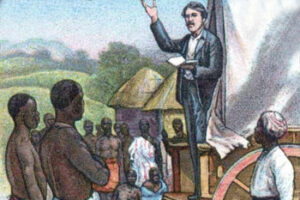
Part 5: Lost in the Heart of Africa
After the British government put an end to David Livingstone’s Zambezi Expedition, everyone assumed that David would retire. He had already explored large parts of Africa, published books, and made speeches in front of large audiences in England.
But David was not done.
At the age of 53, with no significant team, no money from the government, and no promise of safety, he returned to Africa. His mission was simply to find the:
Source of the Nile River.
As the longest river in the world, no one knew where the Nile began. It was a great mystery, and David wanted to solve the mystery not for fame, but for science, for faith, and for the people of Africa.
He departed from the eastern coast of Africa and trekked inland, further than he had ever. He traversed hot forests, muddy swamps, flooded plains, and crossed dangerous rivers; oftentimes sick with fever.
There was no quick way to send a message back to Europe. He walked for weeks and months, sometimes with local guides, and sometimes alone. People began to wonder:
Was he still alive?
Five long years passed without a word from Livingstone. He received no correspondence, no resupply of food, and no assistance from his home country.
During this time, he:
Walked over 11,000 kilometers across central Africa
Became seriously ill on several occasions
Saw horrific sights associated with the Arab slave trade
He lost all of his accoutrements because of illness, theft, and accidents
Almost subsisted on a diet of rice and dried meat
Made important notes in the margins of books and newspapers he used
But he never gave up.
The Body was Weak, But the Spirit was Strong.
David was not simply lost to the world. He was completely alone. Sometimes he was too weak to walk, and his East African companions carried him.
He stayed true to his dream of discovering the source of the Nile, and even when his body failed, his heart remained his.
In Britain, worry began. One man, a U.S. journalist named Henry Morton Stanley, was sent by a newspaper to find Livingstone.
Stanley searched for months. He searched through villages and jungles until he finally came to a town called Ujiji (in present-day Tanzania).
There, he found an old, very thin man with white hair and sunburned skin.
Stanley stepped up and said the now-famous words: “Dr. Livingstone, I presume?”
The world was stunned. Livingstone was alive, but barely.
Stanley provided him with assistance, food, clothing, and a trip back to England. Livingstone would not accept it. He said;
“I must finish what I started.”
He still wanted to determine the true source of the river, despite all his suffering.
To be continued…..
Keep reading dipdives





